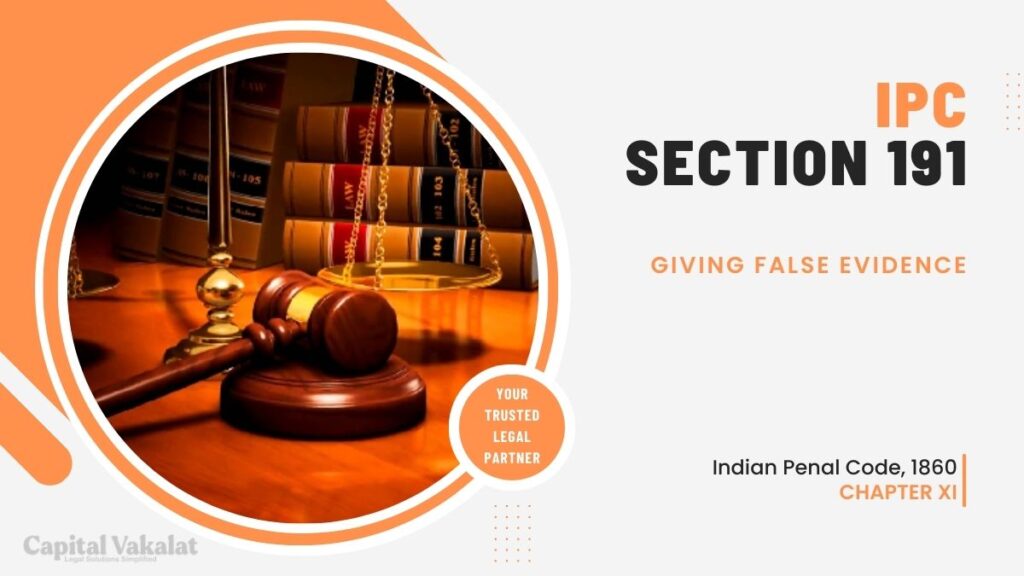Section 191 of the Indian Penal Code (IPC) deals with the offense of “giving false evidence.” This provision plays a crucial role in maintaining the integrity of the judicial system by punishing those who provide false statements, testimony, or evidence in any legal proceeding.

In this article, we will delve into the various aspects of this section, understanding its key elements, potential punishments, notable cases, legal procedures, defenses available, its impact on the justice system, challenges in its implementation, and suggested reforms.
Key Elements
The primary elements of Section 191 IPC include the presentation of false evidence and an intention to mislead the court. False evidence refers to any information that is intentionally fabricated, altered, or misrepresented with the intent to deceive the court, parties involved, or the public.
Punishments
The punishments for giving false evidence under Section 191 IPC can include imprisonment and a fine. The severity of the penalties depends on the nature and gravity of the false evidence presented. The court may impose imprisonment ranging from a few months to several years, coupled with a substantial fine.
Cases
Several notable instances have brought Section 191 IPC into the limelight. High-profile cases involving perjury and the submission of forged documents have led to convictions and stringent penalties for the offenders. These cases serve as a deterrent for those contemplating giving false evidence.
Legal Procedures
Filing a complaint under Section 191 IPC involves reporting the alleged offense to the police or the concerned legal authorities. An investigation is initiated to gather evidence, question witnesses, and evaluate the veracity of the accusations. The court then conducts a trial, allowing both parties to present their arguments and evidence.
Defenses
Defendants facing charges under Section 191 IPC can assert several defenses, including a lack of intent to mislead or a mistaken belief in the accuracy of the information provided. Proving intent to deceive beyond a reasonable doubt is essential for securing a conviction.
Impact
The offense of giving false evidence has a significant impact on the justice system. It can lead to wrongful convictions, miscarriages of justice, and a loss of trust in the legal system. Upholding the truth in legal proceedings is paramount to ensure justice is served.
Challenges
Challenges in implementing Section 191 IPC include the burden of proving the accused’s intent to mislead and the need for rigorous scrutiny of the evidence. The legal system must balance the protection of witnesses and the accused with the imperative of discovering the truth.
Reforms
To strengthen the efficacy of Section 191 IPC, some suggested reforms include streamlining legal procedures to expedite trials, promoting greater awareness of the consequences of providing false evidence, and implementing stricter penalties for those found guilty.
Conclusion
Section 191 IPC, dealing with giving false evidence, is pivotal in upholding the integrity of the Indian judicial system. It deters individuals from providing false information and misleading the courts, ensuring that justice prevails. However, its implementation faces challenges that require constant attention and reform.
This article provides a comprehensive understanding of Section 191 IPC and its implications in maintaining truth and justice in the Indian legal system.
Frequently Asked Questions
Can a mistaken belief be a valid defense in a Section 191 IPC case?
Yes, a mistaken belief in the accuracy of the information provided can be used as a defense against charges of giving false evidence.
How does Section 191 IPC impact the justice system?
False evidence can lead to wrongful convictions and a loss of trust in the legal system, impacting the pursuit of justice.
What are the challenges in proving the intent to mislead in Section 191 IPC cases?
Proving intent beyond a reasonable doubt can be challenging, and it is a key element in such cases.
Are there any suggested reforms to strengthen Section 191 IPC?
Yes, suggested reforms include streamlining legal procedures, increasing awareness of the consequences, and implementing stricter penalties for offenders.